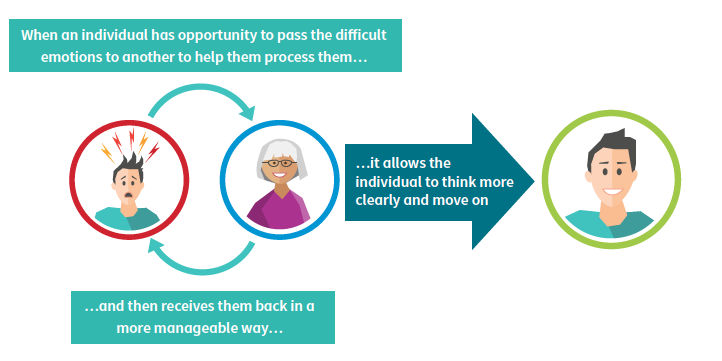
Working with COVID
What is Containment?
Containment involves supporting someone to process their emotions, including anxiety and distress, to help restore an individual’s capacity to think clearly.
In children, this is a core part of emotion regulation, but it is also key for adults, particularly during times of high stress.
Why is it so important at the moment?
We are being bombarded with information and demands, calling on all of our brain power to process and cope with the challenges we face.
When we become more and more swamped with these pressures, we can become overwhelmed and lose the ability to think clearly.

If someone is able to help us process these feelings, it can give us some valuable space to mentally and physically take a breath, regroup and then be able to move on, with some of our thinking capacity restored.
Containment is not taking on someone else’s emotions and shouldering these for them.
Neither is it about getting rid of the emotions.
It is about helping someone to step back, make sense of how they are feeling and become more able to manage those feelings.
How can I help to contain others?
Simply by recognising that someone may be feeling overwhelmed and acknowledging this for them can be a first step in containing their emotions.
You will already be using many of the skills that help lead to a sense of containment for others, particularly when you engage your OARS:
OARS
Open-ended questions – use “How, Why, What & When” questions to open up conversation
Affirmations – genuine statements of support about something important to the individual
Reflections – helps others feel properly heard & helps check out their meaning
Summaries – pulls together what has been said – helps individual feel understood

In order to be able to help contain someone else, you yourself need to have emotional thinking space as you cannot do so if you are also overwhelmed.
It is important that you recognise and use your own sources of containment, whether this be colleague, partner or friend.
What is Reciprocity?
Reciprocity is the dance of interaction between two individuals, when they are tuned in to each other’s emotions and needs, and respond to these in a sensitive way.
Containment and Reciprocity are intricately linked as you cannot have one without the other also in place.
Why is Reciprocity so important at the moment?
Although we are all living through these strange and unprecedented times, everyone will be experiencing them differently, depending on their circumstances and their own internal and external resources.
Reciprocity is essential, in checking in with others about what their experiences are and how they are feeling about them. It ensures that we are not making assumptions and are therefore able to meet people’s emotions appropriately, being in a position to offer containment as needed and to engage in constructive, supportive interactions.
NHS Education for Scotland | Westport 102, West Port | Edinburgh EH3 9DN | Tel: 0131 656 3200 | www.nes.scot.nhs.uk
© NHS Education for Scotland 2020 You can copy or reproduce the information in this document for use within NHSScotland and for non-commercial educational purposes if referenced in full. Use of this document for commercial purposes is permitted only with the written permission of NES.